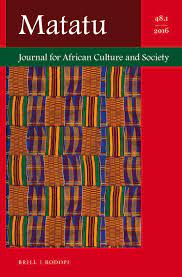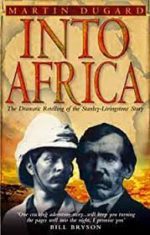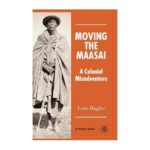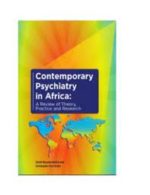Matatu Journal for African Culture and Society is an academic journal on African literatures and societies dedicated to interdisciplinary dialogue between literary and cultural studies, historiography, the social sciences, and cultural anthropology.
matatu journal for african culture & society
KSh 3,000.00
Matatu: Journal for African Culture and Society is an academic journal on African literatures and societies dedicated to interdisciplinary dialogue between literary and cultural studies, historiography, the social sciences, and cultural anthropology.
Related products
-
The Cry of the Go-Away Bird
KSh 1,200.00The Cry of the Go-Away Bird’ is the debut novel from Andrea Eames. It revolves around Elise, a white Zimbabwean girl living through her teens on the eve of the Mugabe-sponsored farm invasions at the beginning of this century. The author herself grew up in Zimbabwe before moving to New Zealand with her family at the age of seventeen and there is a strong sense of memoir and personal experience in the novel, which has both positive and negative effects on the narrative.
The main character is drawn very effectively. The natural anxieties felt when emerging into an adult world are uncannily accurate, and allow the reader to relate to Elise and her family as their experiences later become more extreme. However, sometimes the story is so personal that it verges on one-sided. There is more variety, and a more complex array of emotions and motivations among the white characters than the black ones. The black characters are unfathomable and often sinister. Perhaps this is how Elise really sees them, but the novel could have perhaps painted a more complex picture for the reader of the spectrum of attitudes surrounding these massive social upheavals.
Eames makes various attempts to describe the fragile nature of race relations in post-independence Zimbabwe. Often she succeeds admirably, as when Elise’s parents invite a black farm-worker and his wife over for dinner in an effort to make friends. The awkwardness felt by all is palpable and it is a fine piece of writing. Eames clearly has a talent for describing a society in microcosm. There are examples of Eames’ considerable powers of observation elsewhere in the book too. Of the ‘Bush War’ (or War of Independence) it is said, The war felt like a death in the family – someone whose name was never mentioned, who was cut out of photographs. Of Mugabe, Elise says, He was like a hated Headmaster, overbearing and incompetent, towards whom you felt a kind of loyalty. This metaphor demonstrates that Eames is certainly able to express complicated emotions in a clear and artful manner.
There are, however, times in the novel when the writing fails in this respect. Sentences such as We were Whites, and nothing else and The air between us was a different colour, are clumsy and blunt, and have a taste of bitterness that the story does not benefit from.
The action in the novel is heavily weighted towards the last half, when the actual farm invasions and killings of farmers are taking place. In these pages the book does become compelling. Eames successfully renders the panicked atmosphere of a rapidly crumbling way of life, and the events feel both real and shocking.
Overall, though well written, the novel is trying to tell too many stories in too many ways. Elise’s story is cut-off by the dramatic political events occurring, but those events appear as from nowhere and lack real context. The book is still worth reading for a glimpse into this interesting and unfamiliar world, but there may be better novels to come from Andrea Eames.
-
Letters from Robben Island: A Selection of Ahmed Kathrada’s Prison Correspondence, 1964-1989 Paperback
KSh 1,295.00Late one night in July, 1963, a South African police unit surrounded the African National Congress headquarters in Rivonia and arrested a group of Movement leaders gathered inside. Eventually eight of them, including Nelson Mandela, who was already serving a sentence, Walter Sisulu, Dennis Goldberg, Govan Mbeki, Raymond Mhlaba, Elias Motsoledi, Andrew Mangeni, and Ahmed Kathrada, were convicted of sabotage and, on June 12, 1964, sentenced to life in prison. Soon, these men became widely known as the “Rivonia Trialists.” Despite their imprisonment, the Trialists played active roles in the struggle against South Africa’s racist regime. Instead of being forgotten, as apartheid officials had hoped, they became enduring symbols in a struggle against injustice and racism.
Kathrada and his colleagues were classified as high security prisoners, segregated from others and closely watched. Every activity was regulated and monitored. Among the many indignities visited upon them, the prisoners were prohibited from keeping copies of incoming and outgoing correspondence. Kathrada, or “Kathy” as he is known, successfully hid both.
Letters From Robben Island contains a selection of 86 of the more than 900 pieces of correspondence Ahmed Kathrada wrote during his 26 years on Robben Island and at Pollsmoor Prison. Some were smuggled out by friends; others were written in code to hide meaning and content from prison censors. These are among his most poignant, touching, and eloquent communications. They are testimonies to Kathrada, his colleagues, and to their commitment to obtaining human dignity and freedom for all South Africans. -
Into Africa: The Epic Adventures Of Stanley And Livingstone by MARTIN DUGARD
KSh 2,000.00A gripping retelling of the legendary story of Livingstone and Stanley.
In 1866 Britain’s foremost explorer, Dr David Livingstone, went in search of the answer to an age- old geographical riddle- where was the source of the Nile? Livingstone set out with a large expedition, on a course that would lead through nearly impenetrable, unmapped terrain, and into areas populated by fearsome man- eating tribes. Within weeks his intended journey began to fall apart- his entourage deserted him and Livingstone vanished without trace into the African interior. He would not be heard from again for two years.While debate raged in England over whether Livingstone could be found in the unmapped wilderness of Africa, James Gordon Bennet, a brash young American newspaper tycoon, hatched a plan to capitalise on the world’s fascination with the missing legend. He commissioned his star reporter, Henry Morton Stanley (born John Rowlands in Wales!), to search for Livingstone. Stanley undertook his quest with gusto, filing reports that captivated readers and dominated the front page of the New York Herald for months.INTO AFRICA traces the journeys of Livingstone and Stanley in alternating chapters. Livingstone’s journey is one of trials and set- backs, that find him alone and depleted miles from civilisation. Stanley’s is an awakening to the beauty of Africa, the grandeur of her landscape and the vivid diversity of her wildlife. It is also a journey that succeeds beyond his wildest dreams, clinching his place in history with the famous question- ‘Dr Livingstone, I presume?’ The first book to examine the extraordinary physical challenges, political intrigue and larger- than- life personalities of the Stanley- Livingstone story, INTO AFRICA is a fascinating window on the golden age of exploration and will appeal to everyone’s sense of adventure.
-
-
Contemporary psychiatry in Africa : a review of theory, practice and research
KSh 1,740.00This book harnesses the collective wisdom of African Psychiatry and therefore serves as a departure point for ongoing efforts to refine practice in accordance with the best practice and local needs. There are a number of chapters dedicated to a range of conditions, covering the most prevalent as well as some emerging conditions ranging from HIV related psychopathology to eating disorders. Additionally, the book provides a focus on a related and pertinent Sub-specialist field – that of neuropsychiatry. There is a chapter devoted to child and adolescent psychiatry – a sub-specialist area that is sorely underserviced. The elderly too are not forgotten in this book. Whilst much is spoken of the youth, it is well to consider the ageing members of society. Psychiatry and the law have also been adequately tackled through a chapter on forensic mental health. The book is a ‘must-read’ for academicians, researchers and practitioners in different areas of mental health. Postgraduate students pursuing various aspects of mental health, undergraduate medical students and diploma medical students will find this book quite ideal.
-
Africa: Crude Continent: The Struggle for Africa’s Oil Prize Paperback
KSh 1,992.00Based on thirty years in the global oil game, intimate knowledge of African history and direct experience of over forty countries, this comprehensive book shows that Africa’s flaws are not the whole story, when it comes to the continent’s history. A definitive yet original account of the rush for Africa’s oil, this is also a guide to the hidden face of Africa. Duncan Clarke begins by placing African oil issues in their historical context before tackling the issues of power, nationalism and different parties’ strategies for control that have led to today’s oil scene. This book is the ultimate reference work on oil in Africa – which is vital to everyone’s future around the world.
-
Anthills of the Savannah
KSh 1,600.00He needed to hear Africa speak for itself after a lifetime of hearing Africa spoken about by others Electrifying essays on the history, complexity, diversity of a continent, from the father of modern African literature.
-
Artisanal Fishers on the Kenyan Coast- Household Livelihoods and Marine Resource Management
KSh 1,200.00Overexploitation of natural resources is often associated with poverty among local populations. A multi-disciplinary team studied artisanal fishers along the Kenyan coast on the Indian Ocean. The main focus of the research was on income diversification of fishers, the pressure on marine resources and the relation between the two. Income diversification did not reduce the pressure on the marine environment. Rather, indications are that many part-time fishers are entering the profession. Moreover, fishers with alternative employment stayed in-shore and used damaging gear more often. Policies to stimulate employment opportunities for coastal communities cannot be expected to lessen the pressure on marine resources and need to be planned carefully in terms of industry location, labour requirements and degree of coastal pollution.










Be the first to review “matatu journal for african culture & society”